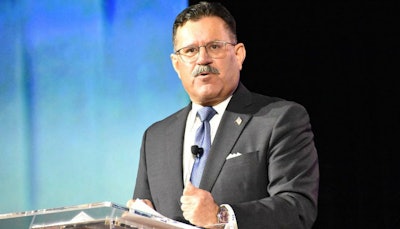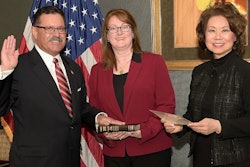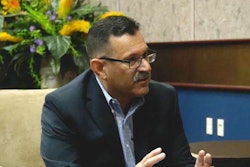
At the Omnitracs Outlook user conference Monday, Feb. 25 in Dallas, Federal Motor Carrier Safety Administration, Administrator Ray Martinez, said the agency is crafting a rule, planned for proposal this year, to change federal hours of service regulations. He also urged carriers to transition from automatic onboard recording devices (AOBRDs) to fully compliant ELDs well ahead of the Dec. 16 deadline, noting the agency doesn’t want to delay the compliance date.
“I don’t want to see in the last few months of 2019 a push for, ‘Hey, we need an extension on moving to ELDs,’” he said. “I really think that uncertainty is not helpful for anybody.”
 FMCSA Administrator Ray Martinez at Omnitraccs conference in Dallas
FMCSA Administrator Ray Martinez at Omnitraccs conference in DallasMartinez’s comments on hours are one of the first public confirmations that the agency intends to publish a notice of proposed rulemaking intended to overhaul hours of service regulations. However, Martinez did not offer any insight as to what the rule will entail.
In August 2018, the agency published an advanced notice of proposed rulemaking (ANPRM) to ask for input on how the agency could add more flexibility to the hours of service rules without compromising safety. FMCSA coupled the ANPRM with listening sessions across the country.
The FMCSA has not made changes to the HOS rules since 2003. Now that the trucking industry is complying with the electronic logging device rule, the agency has been receiving data from motor carriers that “highlights areas in the current existing hours-of-service regulations that we may need to adjust or improve,” said Martinez. “Now that’s a good thing.”
“If we are going to get the benefit of ELDs, we should be able to look at some fundamental changes in the hours of service that have really not been looked at in 15 years,” Martinez said to an audience of more than 800 attendees at the Hilton Anatole resort.
The agency received over 5,200 specific comments for the ANPRM. The quantity and the quality of the comments “were excellent and really informed the agency,” he said.
“I am pleased to report at this juncture, given the quantity and the quality of the comments, that I can announce that we are moving forward to a notice of proposed rulemaking (NPRM),” he said.
Martinez said nothing has been sent to the Office of the Secretary of Transportation nor to the Office of Management and Budget for review. Those two agencies must approve any rulemakings from FMCSA before they’re published.
Martinez indicated the NPRM when developed is likely to have some changes the trucking industry asked for.
“I will say that given the great feedback and the quality of the comments received from industry and from stakeholders and from safety advocates, that we are very, very excited about the prospects of moving forward,” he said.
Based on Martinez’ comments, sleeper berth options appears the most likely to be granted more flexibility in a forthcoming NPRM.
Martinez also announced the FMCSA is finalizing an ANPRM that seeks input from the industry on adopting Advanced Driver Safety systems. The agency wants input for vehicle inspection protocols, human-system interaction and workforce issues, among other areas for new vehicle technology.
“The key is to support innovation and technology in this industry going forward,” he said.
Relative to transitioning from AOBRDs to ELDs, one reason why fleets are postponing the process is the new ELD rule requires that drivers be given the option to accept or reject edits made by companies to their log records.
Ray Greer, chief executive of Omnitracs, said that currently only 10.7 percent of its customers that are required to be compliant with the ELD mandate have converted from AOBRDs.
“Our customers have effectively kicked the can down the road due to the complexities of making the change and the productivity impact,” he said. “You cannot put this thing off any longer.”
Another work in progress at the FMCSA is the new scoring model for its Compliance, Safety, Accountability (CSA) program. Martinez says the new model, based on the IRT scoring method for violations, should be in place by the end of 2019.
He also mentioned the status of the crash preventability pilot program that allows carriers to dispute accidents on their records they were not their fault. The pilot program concludes in August 2019 and the plan is to move it towards full implementation.
“I think 2019 is going to be a very big year for that,” he said.











